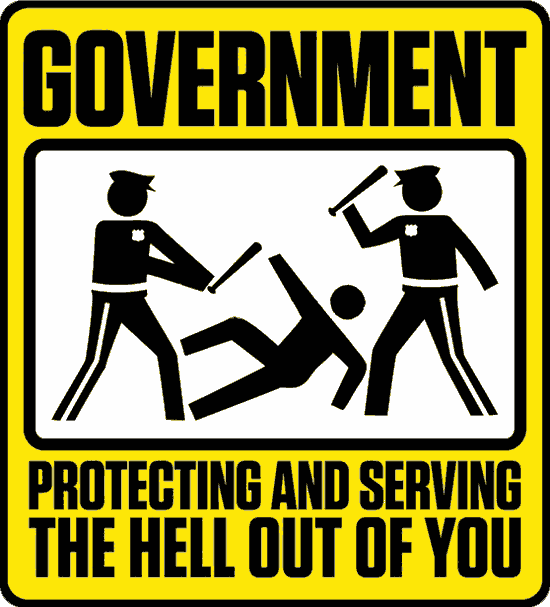Legal Self Defense - Is learning law really dangerous?
If you start educating yourself about law, you will soon run into many who will claim that simply learning about law is dangerous.
They are not wrong, though they too often fail to state clearly who such knowledge is dangerous to and why.
Dangers to those learning law
Simply learning how law works (even if you don't use it) can be dangerous to your world view.
If you attempt to apply what you learn foolishly, it can be very dangerous to you.
If you attempt to apply what you learn wisely, it can be very dangerous to those that would rule you, which in turn makes doing so very dangerous to you.
Any way you look at it, learning law truly is dangerous.
Learning law is akin to putting on a pair of shades in the movie They Live

No Thought. Stay Asleep. Obey. Submit.
While you won't immediately see drastic changes, as you come to comprehend how our process of law is supposed to work and start to wrap your head around rights, due process, nexus, and causes of action, you will begin to see that much of what everyone knows is simply wrong.
The more you learn, the more you will be faced with having what you think you know being diametrically opposed to what you are learning. This can be painful.
If you continue to learn in spite of finding your preconceived notions shattered, there are a number of dangers you will run across that are closely related to the signs in the above image.
NO THOUGHT: You might start thinking.
My kids often tell me that a variety of things are against the law.
Like most adults, they don't know the difference between legal and lawful.
Nor do they step back and consider purported laws through the lens of their rights as people.
If you believe that all people should have equal rights, you might agree with the following statements:
- No one has the right to force anyone else to do something.
- You can do whatever you want so long as you are not violating the rights of others.
- If you lack a right, you cannot give it to someone else.
- If a representative stands in your place, then they cannot have rights that you do not have.
Statements 1 and 2 above fit snugly within the law as viewed through the lens of causes of action (lawful: the rule of law).
They also fly in the face of the very idea of legislation (legal: the rule of man).
Together, statements 3 and 4 above fly in the face of voting on anything that would violate the rights of anyone.
STAY ASLEEP: You might wake up to what is going on around you.
As you start to see just how simple our process of law really is, you might start to suspect that there is a conspiracy to ensure that the average people never learn to access the law.
You might even start asking some of the following questions:
- Is law so complicated that the average people cannot comprehend it?
- Why is law not taught in public schools?
- Why is public speaking not taught in public schools?
- Who benefits when the average people do not comprehend the law?
- How might things change if people had easy access to the law?
Your answers to these questions might cause you to start looking at public schools, colleges, mainstream media, television programming, and many other common things in a very different light.
Go down the rabbit hole far enough and you might even start looking at maps differently.

What if the fruit of our labor is simply being farmed?
Who knows, you could even become one of the anarchists your mom warned you about!
Anarchist: Someone that does not believe that some groups of people have the right to forcibly rule other groups of people.
OBEY : You might stop obeying arbitrary authority.
Instead of just doing what you are told, a reasonable understanding of law might start causing you to ask that those who tell you to do something do one of the following:
- Convince you to do so of your own free will
- Prove that they have the right to force you to do them.
The first is how sane, healthy people go about life.
The second will typically require some kind of valid, enforceable contract.
Of course, there is always a third path, the one hidden just below the surface that most people won't willingly talk about:
- Act in a criminal fashion (use brute force and/or coercion) to get you to do what they want
This is where there can be real danger, even if you truly do have an accurate view of how law works.
Criminals are criminal because they do not live within the law.
If you don't obey and those who command your obedience think they can get away with using criminal action to force you to obey, expect a fight.
If you aren't completely (and justifiably) confident in your ability to defend yourself, expect to be injured.
If you don't have an accurate view of just who you are dealing with (see SUBMIT below), any injury you sustain might be much more serious than anticipated.
Government Warning: Not obeying would be authoritarians can be very hazardous to your health.

Learning law can be dangerous when criminals enforce legislation.
Copied from http://hearingvoices.com/2011/10/protect-the-shit-out-of-you/
SUBMIT : You might stop submitting to arbitrary authority
This is where things can really start to get dangerous, not because you would be outside of your rights to defend yourself, but because those who would rule you:
- Are organized
- Are willing to break the law if they think they can get away with it
- Control public television and most printed news
- Have deep pockets due (those of all of their subjects)
Men and women who would forcibly govern others are criminals.
Whether you agree with this statement or not, if you start defending yourself from those who would govern you (or even more dangerous, going after those that violate your rights), you need to be realistic about what you are doing and who you face.
Who is the government?
Governments are organized groups of people who are themselves notably ungoverned.
Most people calling themselves governments live off of the fruit of their subjects labor by creating legislation to:
- Create taxes (fine their subjects for being productive, owning property, etc.)
- Create tarrifs (fine other groups subjects if they want to trade with their own subjects)
- Criminalize lawful actions (fine their subjects for going against their will)
- License unlawful actions (charge their subjects for the privilege of breaking factual law)
- License criminalized actions (charge their subjects for the privilege of going against their will)
- Grant themselves retirement packages (paid via the above mentioned fines and taxes)

Try to stop paying and find out where your payments are going.
Copied from http://www.csa1776.org/cartoons/cartoons20130621.php
In so far as they force their will upon others, they are criminal in nature... whether they act with the will of the majority or not.
It is worth noting that I'm not saying that everyone in government is crooked. In fact, many are perfectly decent people if encountered out on the street, especially those removed from any serious perceived power.
That being said, you might consider who would want the seats of power more... those who would abuse them or those that would not.
What are you doing if you refuse to submit?
If you start defending yourself publicly via lawful process you threaten those who would govern you in a variety of ways:
- You threaten their control - if they cannot make you submit then their legislation means little
- You threaten their way of life - if they cannot make you pay them they might have to get real jobs
- You threaten their image - if they cannot make you submit then they may be perceived as weak
Because of these things, even defending yourself against government aggression is dangerous, doubly so when they control the media and train their subjects to think that they are kind and benevolent.
Make no mistake about it, facing down would be rulers carries the same risks that facing down a large organized mafia with deep pockets might carry: excessive fines, excessive jail time, serious physical injury, and potentially death.
If you are crazy enough to stand up to such people then be sure to not over-estimate your knowledge, see if you can find a good lawyer that you can afford to help as counsel so that you don't get tripped up by minor mistakes, and don't even start if there is anything that could get you to back down. Better to lie down sooner rather than later.
What are you doing if you file suit against such people?
This is even more dangerous than defending yourself simply because the moment you file a complaint it becomes public record.
While a knowledgeable man can effectively defend himself before things turn into a lawsuit, once you make your contest public you leave them with no choice but to attempt to make an example of you.
Only you can decide whether doing such a thing is worth the risk that it brings.
As with defending yourself, don't even start if you can be made to back down.
Some ideas for learning law safely
Don't start actively using what you learn until you are confident that you know what you are doing.
Learn the rules:
Don't take other peoples word for how things work, study the appropriate written rules:
- Federal Rules of Civil Procedure (lawful process)
- Federal Rules of Criminal Procedure (legal process)
- Federal Rules of Evidence (both processes)
Don't forget your state rules and any extra rules for the court in question.
Do your own research and consider what everyone says with a few grains of salt.
Avoid a law suit whenever possible
Our processes of law are meant to resolve disputes that cannot be otherwise resolved without resorting to violence.
It is almost always better to learn how to avoid a lawsuit entirely. Some helpful things to research:
- Conditional Acceptance: Agree to do what is demanded once they prove that you are obligated to do so - this establishes good faith in case you must go to court.
- The difference between the legal terms required and obligated. IN fact, take the time to read an older (clearer) law dictionary such as Bouvier's and ponder what you read. Don't forget to look up every word you read to make sure that it doesn't have a legal definition that is quite different from the common English definition.
- Where to find the law: Be sure you aren't referencing evidence of law if you can help it
- How to read law properly: You can read the law and easily fail to comprehend what it says if you don't know how to read law.
- Read about common law: The laws that our laws are built upon
- Make notes on everything: If you might end up in court, make notes and have witnesses if at all possible.
- Presumptions: Learn to attack the presumptions that are being made against you by asking to have them made clear.
- Causes of Action: Learn what people can lawfully sue for via civil process and what elements must be proven to establish guilt and you can more reliably defend yourself.
Take time to learn these things and many lawsuits become entirely avoidable.
If you must fight, fight intelligently
If you must be part of a lawsuit, be sure to write clearly and simply, stick to the causes of action presented, and focus entirely on the elements that must be proven to win.
Prove any single element of a cause of action false and get it dismissed.
Prove all elements of a cause of action and win.
Start in the shallow end
This goes hand in hand with avoiding lawsuits.
If you want to start using what you learn, start out by fending off small things such as minor local ordinance violations... and start by simply asking questions.
Always consider what you are willing to risk and what consequences you could face for standing your ground.
Above all, fight or don't fight
Remember that a court battle is a fight.
If you can be made to give up, then you might as well give up immediately.
Doing otherwise is just asking to have penalties stacked up when you finally do throw in the towel.
Parting thoughts
I study law because I want to live in a better world and I want my children to do so as well.
If even five percent of people started demanding proof before paying fines and/or doing what they are told, things would have to change dramatically as the current system is designed around reliance on people just doing what they are told.
Can you imagine what would happen if 1 in 10 people demanded at least a hearing for every ticket and/or fine they received, even if only to go in and ask questions before paying? I can and it puts a smile on my face.
@sigmajin.... Why?
i actually removed the dv because there isn't as much absurd quackery in this post as there is in most of this authors posts about law.
Yes, you absolutely should learn about law. And FWIW, i do not agree that it is or ought to be so complex that the average person cannot understand it.
But someone who clearly does not understand basic concepts (like what an objection is for and when its appropriate to use it) is doing a disservice to everyone who reads his material. In the same vein, i think everyone ought to know something about car repair. But the guy telling you to fill your gas tank with sugar because he read a car repair manual and didnt understand it isnt helping you fix your car. Hes helping you destroy it.
Even someone like you (i gather from your other comments that youre an anarchist of some stripe) -- if youre going to defend life and liberty in a courtroom, youre doing yourself a disservice by using this authors made up distinctions between "legal" and "lawful", or by using his deficient understanding of courtroom procedure.
FWIW, this is from someone with hundreds of hours experience in criminal litigation and thousands of hours experience in administrative litigation.
Thank you @sigmajin... I cannot speak for Tony Jennings but I am quite sure it means a lot to both of us to have such a powerful entity grace us with a response.
I must admit I thought you were an Anarchist too. Because the Guild provides human enforcement of group desires for good (AKA social justice).
Out of curiosity, is there somewhere you would recommend that those wanting to learn how law works go to learn?
My personal experience is primarily based in civil court and dealing with local level attempted enforcement of absurd legislation.
You can make fun of my views on lawful/legal all you want, but I'm actually curious as to whether or not there is publicly available information (beyond the available online copies of the rules of procedure and evidence that are out there) that you feel does a good job of explaining laws and rights in a meaningful manner.
Mostly all one can find is smoke, mirrors, obfuscation, and copyrighted encoded law... hence the reason I'm (slowly) posting what I've learned and what I've found to be reasonably correct in my own experience and experiments.
If there is a good place to learn "real" law properly in a reasonably clear manner I'd love to hear of it. The best information I've found to date has come from reading Corpus Juris, the rules of evidence and procedure, and a few seemingly honest lawyers with a good deal of experience... and it has served me well thus far.
I believe the comments on this post explain the initial downvote.
They also explain why I wrote this piece. I thought about what he said, agreed that learning law is dangerous, and decided to explain why... and this is the result.
The only thing anyone should learn about law, is that human enforcement of it is immoral.
If by law you are referring to legislation, I'm in complete agreement.
I draw a clean distinction between illegal (against the will of some people) and unlawful (causing harm to people) acts.
Human enforcement of something other than legislation(human invented law).... would be a sight to see...
"Ladies and gentlemen, as of today the new Trump executive department will be enforcing the law of gravity"
LOL
Your distinction is fine by me, so long as one can obtain an objective understanding of "harm".
Congratulations @tony.jennings! You have received a personal award!
Click on the badge to view your own Board of Honor on SteemitBoard.
For more information about this award, click here
triply excellent. thank you once again tony. more and more please. will always upvote